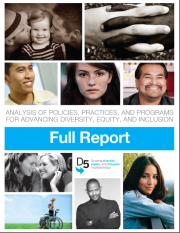
In a recent post on The Funders’ Network blog, Paula Dressel of JustPartners, Inc. and co-author of D5’s Analysis of Policies, Practices, and Programs for Advancing Diversity, Equity, and Inclusion (DEI) states, “Most foundations’ missions cannot be optimally achieved without explicit attention to inequities that run the fault lines of race, gender, LGBTQ status, and disabilities.” In short, DEI is mission-critical.
Read Paula’s full post to learn the steps that funders can take to advance DEI in their organizations – and sustain it.
How do foundations get started advancing diversity, equity, and inclusion (DEI)? What resources are out there to guide our efforts? What is the state of DEI work in philanthropy, and why is it important? Commissioned by the D5 Coalition, JustPartners, Inc., recently completed a comprehensive scan and analysis of the programs, practices, and policies being used to advance DEI in philanthropy.
We discovered that a key factor inhibiting DEI action – even when the political will for it exists – is the lack of clarity about how to proceed. What can we do to point the way forward? The scan offers on-ramps to help foundations at every level to advance DEI and illuminates many opportunities for the field.
In the scan, Greg Hodge and I identified many excellent resources to guide thoughtful philanthropic action informed by issues of race, gender, LGBTQ status, and disability. In one way or another, all of these dimensions are place-based and about issues of access – to housing, transportation, public and personal safety, jobs, recreation, civic engagement, and other characteristics of daily life—making the scan especially useful to TFN members. We urge foundations to imagine and specify how the ability to address DEI issues will enhance their mission performance. Truth is, most foundations’ missions cannot be optimally achieved without explicit attention to inequities that run the fault lines of race, gender, LGBTQ status, and disabilities.
With these considerations understood as mission-critical (and stakeholders being able to explain how), they are more likely to inform a foundation’s strategic plan, its action steps, and the performance measures it uses for its operations and programs. Most important is having a clear analysis about how different groups are differently affected by an issue and then employing that analysis within the fabric of every day work to advance strategies that positively impact all people and communities. Start with that analysis, and then build on it. Further, transformational work is not only about results – it’s also about the process for getting those results, including who is at the tables where the work is shaped and implemented.
DEI work requires certain ingredients to make it sustainable. These include good analyses and some initial wins that reinforce the business case; ongoing and broadening leadership commitment (which is fueled by the business case); the institutionalized “hard-wiring” of DEI considerations into core documents and processes; and disaggregated data for tracking impact for different groups.
For each of these, our scan suggests specific action steps that foundations of varying sizes and issue areas can take to institutionalize and sustain the work that promises transformation in opportunity. We hope you and others pick up the scan and find the best way forward for your foundation.
TFN recognizes that a sustainable community is one that operates to provide opportunity for all of its residents. History documents the struggles for opportunity and access undertaken by all of the groups D5 focuses on – people of color, women, the LGBTQ community, and people with disabilities. There is still work to be done.
The way the author of A Disability History of the United States identifies that struggle for one group is actually applicable to all. He says that it is the struggle to answer: “Which peoples and which bodies (are) considered fit and appropriate for public life and active citizenship?”
Transformative philanthropy answers that question by affirming, “All of us.” We invite you to read and share the D5 scan, and see what resources are available to ensure that all of us can thrive in the places we call home.
Tags: action, JustPartners, policies and practices, research